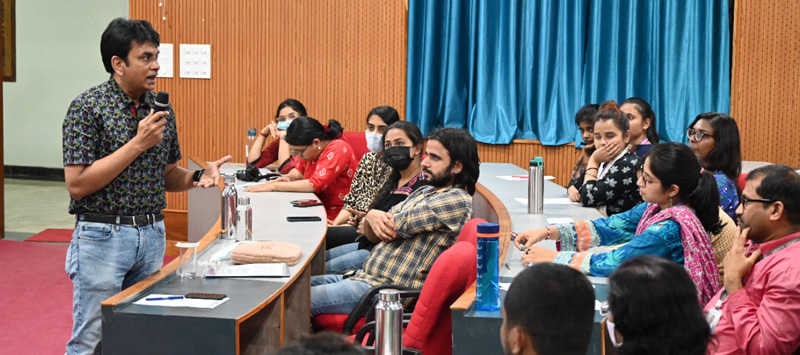
‘Meet the Scholar’: A new chapter in the book memories
Sanaaz Fathima Khan
The content subjects at university levels usually demand students to have activities more independently with many discussions and presentations. In this case, the characteristics of students are highly proactive, and gain self-confidence to accomplish all processes and activities in the class. The affective aspect of being self-confident in this case is very important to be notified of the content subjects for adult learning, especially at university students (Ga, 2004; Samsudin, 2012). The ones with high self-confidence have good potencies to have improved acquisition because the confidence has already made the students aware of preparing the readiness to experience the class (Mifsud, 2011). Otherwise, when the students do not have enough confidence to join the class, the danger is that they will never enjoy the learning and finally it creates a high possibility to deviate from the class (Koosha, Ketabi, & Kassaian, 2011; Butt, Moosa, Ajmal, & Rahman, 2011; Sabokrouh, & Varandi , 2013). Self-confidence is built because the students have natural experience in the process of achieving learning goals and learning process. The learning goals are important to consider because that is the initial process to orient the students to accomplish all activities easily. This goal realization usually causes easiness in realizing the process of learning especially the strategy that is offered by the lecturer (Anwar, 2015). In fact, the choice of a teaching strategy which really opens students’ awareness to naturally join the process of learning is not easy. Even the most complicated teaching strategy does not always guarantee the successful engagement of the students. There should be some fundamental issues that are grounded in the successful implementation of teaching strategy in adult learners. Some experts agree that the more varieties and authenticities of the teaching procedures given to the adult classroom will potentially open students to create genuine creativities and learning outputs. This, in turn, automatically creates the student’s capacities to increase their self-confidence because they feel that the activities can be accomplished individually and easily or in the group, which finally makes them enjoy the class (Anwar, 2010).
Universities usually insist or rather require students to engage in activities that create an outlet for independent thinking. Such activities include panel discussions, presentations, seminars, debates, and so on. When engaging in such activities, the essence of every student’s character becomes highly proactive alongside the growing sense of self-confidence to perform and have a constructive discussion in the presence of an audience. Self-confidence in students is built based on the natural experience that they have in the course of learning and achieving goals. Apart from the individual aspect of gaining self-confidence, panel discussions are the trademark of conferences and events. The notion of a panel discussion is to ignite a conversation wherein different perspectives regarding a particular topic are brought to light.
Understanding the gravity of panel discussion in the learning and growing journey of a student, the Department of Media studies, Kristu Jayanti College, hosted a panel discussion titled ‘Meet the Scholar’. This new refreshing initiative was taken by Dr. Juby Thomas (Head of the Department for Media Studies- PG). ‘Meet the Scholar’ was an interesting take on providing more extensive knowledge regarding various scholars who have contributed to the field of mass communication.
A few such scholars whose personal, social and educational doors were knocked on included John Fiske, Warren Weaver, Jean Baudrillard, Dennis Mc Quail, Marshall Mc Luhan and the list goes. It was an overwhelming experience for the students and so they claim “We got to play the role of a paparazzi for a day. From their social, and personal life to their contributions was all the gossip was split. It was nerve-wracking to stand there and present in front of an audience but it’s worth it.” The to-and-fro walking, charcoal smudges on paper making notes, hurried footsteps into the panel room, quenching the thirst of dry throats due to nerves. Final sigh of approval all are memories tied to the word ‘Meet the Scholar’. This panel discussion is a live example of how students not only get the space to hone their self-confidence, presentation, thinking and investigating skills but they also get to escape from the monotonous routine of being a book worm. “It was as if I was Aristotle. I got to be him and see the world from his point of view, even though he is long gone from this world…I got to bring him back to life. Every time a book is read, a video is watched, a poem is written or even a discussion is carried out on a certain topic or person, they get to live a hundred lives” quoted a student from MA JMC who was part of the panel.
With such discussions, students get to add books of right judgment to their library of knowledge. It’s not always about how many books of scientific knowledge you get to add to those empty shelves in your mind but rather the experiences that you tread on and pick up while hunting for the right book. ‘Meet the Scholar’ is one such experience that will become a branch of many new leaves that are yet to grow.